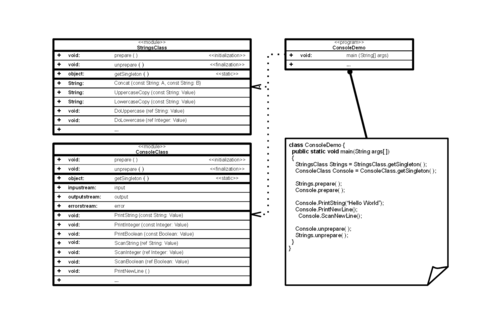In software engineering, the module pattern is a design pattern used to implement the concept of software modules, defined by modular programming, in a programming language with incomplete direct support for the concept.
Contents
- Definition & Structure
- Concept
- Features
- Implementations
- Object-oriented programming languages
- Prototype-based programming languages
- Procedural programming languages
- Comparisons to other concepts
- Namespaces
- Classes and namespaces
- Singleton classes and namespaces
- Relationship with other design patterns
- Module as a design pattern
- See also
This pattern can be implemented in several ways depending on the host programming language, such as the singleton design pattern, object-oriented static members in a class and procedural global functions. In Python, the pattern is built into the language, and each .py file is automatically a module. The same applies to Ada, where the package can be considered a module (similar to a static class).
